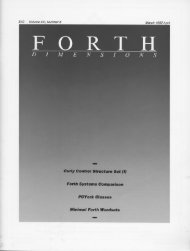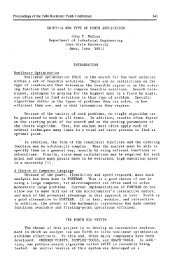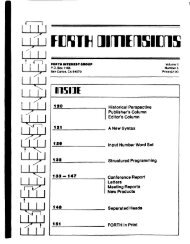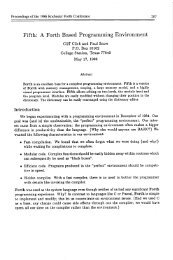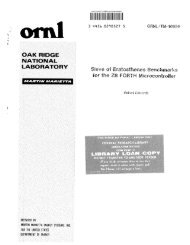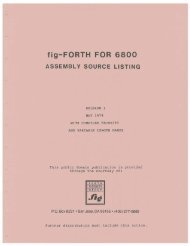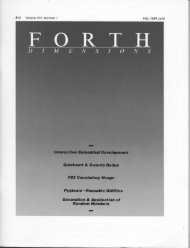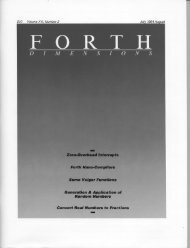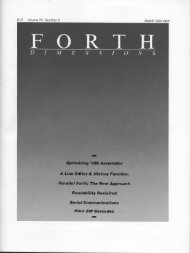2 - Forth Interest Group
2 - Forth Interest Group
2 - Forth Interest Group
Create successful ePaper yourself
Turn your PDF publications into a flip-book with our unique Google optimized e-Paper software.
Readers are encouraged to respond to "Fast <strong>Forth</strong> ward. "Here, Doug Philips probes<br />
k @ the preceding installment ("For Want ola Kernel Development Environmentn).<br />
"Architecturak Support for Kernel Extension" is a greai<br />
idea, especially the framework for hanging new bnctionality.<br />
However, as you noted, ANS <strong>Forth</strong> backed away<br />
from, or didn't even try to approach, the "development<br />
environment." I suspect that it will be very tough to come<br />
up with a development environment/<strong>Forth</strong> system which<br />
is extensible, yet does not specify implementation details<br />
at too fine a level. I am not even sure yet that a kernel<br />
extension environment is in any way different from a<br />
specified implementation.<br />
I must point out that Mac-based <strong>Forth</strong> systems have been<br />
around for a long time, so I take you task for assuming that<br />
any kind of GUI enhancements are tied to Windows. If I were<br />
to be a Mac snob, I might notice that the Mac has been doing<br />
GUI for a lot longer than Windows, and that if Windows<br />
needs GUI refinement or interface enhancement, it is because<br />
it is so much more immature. But I digress. I just wanted<br />
to point out a Windows-centrism that I think is irrelevant to<br />
the points you are making in this article. Back on track.. .<br />
I am most puzzled by your scorn of metacompilation.<br />
There have been several articles in FDalone, over the past<br />
few years, that have tried to debunk the myth that "oooh,<br />
metacompilation is hard." Clearly, they have failed. One<br />
thing that remains puzzling, though, is why you don't<br />
consider simplifying or regularizing metacompilation just<br />
like you want to do with the <strong>Forth</strong> kernel itself. Instead,<br />
you are advocating (if I read you correctly) that C become<br />
the assembly language for <strong>Forth</strong>, and that metacompilation<br />
be replaced by ordinary C compilation. I don't see this<br />
as a particularly attractive tradeoff, though I once thought<br />
it was. The advantage to it seems to lie in writing the <strong>Forth</strong><br />
kernel in as common a dialect of C as you can, to enhance<br />
portability. However, using C means having a different<br />
language that someone needs to know in order to make<br />
certain kinds of kernel enhancements, or to deal with C<br />
compiler portability issues, or to depend on having a C<br />
com~iler (or cross-com~iler) available to get to a new<br />
platfbrm. Attractive as C is as a "universal" assembler, both<br />
in terms of "I already know C" and "C is everywhere, writing<br />
a C compiler is someone else's problem, and besides there<br />
are C compilers for every platform that Icare about," I think<br />
it is the wrong approach. As to being able to link with C<br />
code, yes, I think that is very important. Again, I am worried<br />
about being seduced by the apparent ease of doing so<br />
simply because linking C with C is easy.<br />
Why not address the problem of being "linker friendly"?<br />
On many Unix systems, one can link C, Fortran, Pascal, etc.<br />
together in the manner you describe. In fact, once you have<br />
a library file, it is completely irrelevant what language it was<br />
built from. Again, I don't think having a component-oriented<br />
<strong>Forth</strong> requires building <strong>Forth</strong> from C, though that is a very<br />
attractive and "it can be done now" possibility. In fact, it might<br />
even be worth doing as a step along the path to getting a real<br />
metacompilable <strong>Forth</strong> that is no harder to understand than<br />
simple Unix makefile technology. What bothers me about it<br />
is that it would not be an absolutely trivial effort and I am not<br />
convinced that it really would be a step in the metacompilation-knowledge-enhancing<br />
direction-at least not a big<br />
enough step to make the effort worthwhile.<br />
On page 37, near the top of the first column on that page,<br />
you say: "But what if some speedier or more expansive<br />
file I/O hooks into the kernel are needed? Then you may<br />
be forced to undertake an overhaul of the kernel, where<br />
you don't have the clarity and other advantages of a high-<br />
level programming environment." This has me com-<br />
pletely baffled! It makes sense only if you consider the<br />
alternative to C to be assembly language (and not<br />
metacompilation); it also assumes the assembly language<br />
implementation has somehow lost the component-ness<br />
you were giving to it earlier. Furthermore, I think you are<br />
making assumptions which are just not reasonable. The<br />
dangeddownside of an assembly language kernel is that<br />
the assembly language is at too low a level. You never<br />
raise the consideration that what is needed can't be done.<br />
However, that is a much greater danger when you have<br />
to write your kernel on top of C. What if you need to have<br />
functionality changes, not just at the <strong>Forth</strong> kernel level,<br />
but also at the component level? This happens a lot with<br />
C, in that you need to plug in your own memory-<br />
management functions. But the C library comes with its<br />
own memory-management functions and, even worse,<br />
other functions in the C library that you want to use will<br />
be using the C library's memory-management functions.<br />
Boom, you are hosed. Many, many times, the only<br />
solution is to create yet another layer of indirection<br />
(my-malloc, my-free) which can be hidden behind a<br />
clever layer of macros, but that in turn has its own<br />
problems! Yes, you might argue that the problem is that<br />
the C library is too monolithic, and that C compiler/<br />
runtime vendors ought not to bundle it that way. But they<br />
do. And while you might find more component-oriented<br />
systems (GNU C might be amenable to being modified in<br />
this way, though maybe not.. . at least you can get the<br />
source code to experiment with!), that drastically reduces<br />
the portability of the code that depends on it. Such a<br />
reduction would completely undermine the portability<br />
I don't see this as a<br />
particularly attractive tradeoff,<br />
though I once thought it was.<br />
justification for using C.<br />
Further down that same page, you say, "Using lots of<br />
execution vectors in a <strong>Forth</strong> kernel gives us a somewhat<br />
similar flexible code base in a <strong>Forth</strong> environment." I<br />
would assert that they give you exactly the same flexibil-<br />
ity. The mild performance hit isn't a matter of flexibility,<br />
but merely a side effect of how it is implemented. In fact,<br />
it gives you an even greater amount of flexibility, because<br />
there is no widespread ability in C to revector function<br />
calls on the fly. Yes, you can use function pointers in C,<br />
but they are exactly the same as DEFERed words. The<br />
"plug and play" linking process resolves the symbols<br />
once and for all. The difference here is that, in <strong>Forth</strong>, the<br />
user of the word can benefit from using a DEFER^^<br />
without knowing it is deferred, whereas C requires you<br />
to write function calls through function pointers differ-<br />
ently ... you can't merely change the definition of the<br />
(Continues on page 30.)<br />
- --<br />
<strong>Forth</strong> Dimensions 39 July 7995 August



